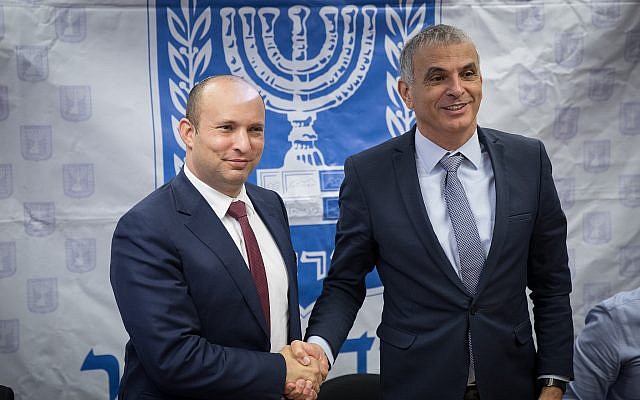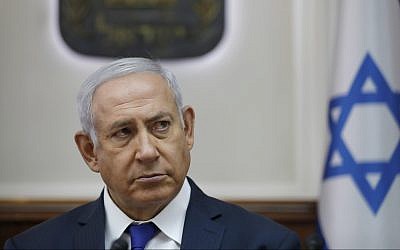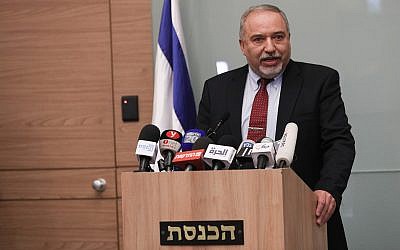Kulanu head now says he has no objection to Bennett as defense minister, but both say coalition too unstable following Liberman’s departure

Party leaders Naftali Bennett, head of the Jewish Home party, and Kulanu chair Moshe Kahlon, both significant members of Prime Minister Benjamin Netanyahu’s Likud-led coalition, have agreed to push for national elections to be held on March 26, 2019, Hadashot news reported Saturday night.
The report came as both Bennett and Kahlon voiced their clear support on Saturday for a national vote well ahead of November 2019, when the current government’s term is set to end.
Each argued in separate interviews aired Saturday that the sudden resignation last week of Avigdor Liberman as defense minister over the Gaza ceasefire, and the departure of his Yisrael Beytenu party from the coalition, leaving it with a 61-59 majority in the 120-seat Knesset, left the government untenably weakened and new elections are warranted.
The Jewish Home party has threatened to bolt the coalition if Bennett would not be given the defense portfolio, a move reportedly opposed by Kahlon.
But in an interview Saturday on Hadashot TV, Kahlon said he would have no problem with Bennett as defense minister and that “whoever Netanyahu appoints” would be acceptable.” However, governing effectively will be “impossible” with just 61 of the Knesset’s 120 seats, and the coalition will be too unstable, he said, siding with Bennett on his call for early elections.
Netanyahu has been trying to avoid calling elections, meeting with Bennett last week and setting a sit-down with Kahlon for Sunday to persuade him to save the coalition.

“If Kulanu doesn’t topple the coalition – the coalition stands,” Netanyahu wrote on Twitter Saturday, adding that “a right-wing government should not be brought down.”
Kahlon confirmed he would meet with Netanyahu on Sunday “to hear what he has to say” but appeared convinced early elections were in the offing.
“I have a 9:30 a.m. meeting tomorrow,” said Kahlon, “maybe Netanyahu will surprise [me] and pull a rabbit out of his hat.”
The meeting was later moved to 6:30 p.m. Sunday.
Asked whether he felt pressured, given Netanyahu’s and his Likud party’s stance that the coalition’s fate was in Kulanu’s hands, Kahlon said the ruling party’s “spins don’t work on me; they need to stop with the threats, I’m not working for the Likud; I left the Likud and founded my own party. I’m their partner [now].”

In a separate interview aired Saturday, Bennett said his meeting with Netanyahu last week was a “good meeting,” where the prime minister expressed his willingness to appoint him defense minister.
But, said the Jewish Home leader, “what came up is that there is no government. We don’t have enough to govern. Liberman brought down the government by leaving… It cannot be resurrected… We have no choice but to go to elections.”
“Not only has he destroyed Israel’s security but he has brought down the government,” he accused.
Bennett said Liberman has been “constantly pulling us [the coalition] left,” and a “genuinely right-wing government” was needed.
“The question in the next elections will not be who is the prime minister, because it’s Netanyahu. It will be how right wing the government [is],” he said.
Kahlon too said he was sure the next government would be right-wing, and more stable with Netanyahu at the helm. He said he would want the finance portfolio to continue his work as finance minister.
The Prime Minister’s Office issued a statement Saturday in response to Bennett’s comments, saying “there is no reason to go to early elections,” and calling on the Jewish Home leader to “show some responsibility and not lend a hand to the toppling of a coalition that could govern for another year.”
A senior official in the ultra-Orthodox Shas party, which currently holds seven seats in the coalition, said the party was not opposed to elections but “should the prime minister want to continue with the current government, Shas will support it.”
Zionist Union opposition party chief Avi Gabbay called on Saturday for new elections to be held “as soon as possible.”
The political crisis began after an undercover Israeli raid in the Gaza Strip early last week went awry. The raid led to two days of intense cross-border fighting. Gaza’s Hamas rulers fired hundreds of rockets at southern Israel, while Israeli warplanes targeted scores of Hamas military sites in Gaza.
After two days, Egypt brokered an informal truce between Israel and Hamas. Though Netanyahu averted a war, he drew blistering criticism from both the right and left for his decision to accept the terms of the agreement after the unprecedentedly intense barrage on Israel’s south.
Liberman resigned in protest on Wednesday. In his resignation letter, the outgoing defense minister said Netanyahu had capitulated to terrorism.
Support for elections?
Hadashot TV aired the results of a poll Saturday night showing that 53 percent of Israelis felt the political situation warranted early elections, while 32% felt it did not, with 15% responding that they did not know either way.
The poll was conducted by Midgam Institute for Hadashot TV, and pollster Dr. Mina Tzemach in partnership with iPanel, an online survey platform. Hadashot TV did not say how many people were polled and what the margins of error were.
The survey also showed that should early elections be held, the Likud would win 26 seats, down from the party’s current 30, and that should former IDF chief of staff Benny Gantz join the center-left Zionist Union, the party would garner 24 seats, up significantly from recent polls which gave it no more than eight seats.
Gabbay has said he would not rule out a coalition with the Likud, though not headed by Netanyahu.
The same survey showed that the Yesh Atid party headed by Yair Lapid, currently with 11 seats in the opposition, would go up to 14, and Jewish Home would garner nine seats, just one more than its current eight.
Liberman’s Yisrael Beyteynu would also not do much better than its current five seats, and would win six, according to the poll.
As reported by The Times of Israel
